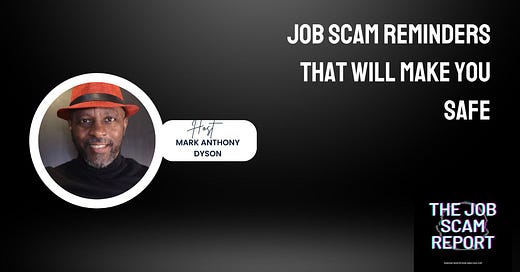Welcome back to “The Job Scam Report” podcast. There are many first-time listeners, so welcome. I am grateful that you’re listening, as you wish to job search safely and strategically. Subscribe and you’ll find the advice will help you secure your personal information and find work.
If you’re not looking, there are some solid job search tips available here and on the mothership website, The Voice of Job Seekers.
IN THE NEWS…
Jeanine Skowronski, a well-known national journalist and editor, featured my job scam advice in her popular “Money As If” newsletter. I hope you’ll subscribe to her most excellent newsletter, as she is doing great work in the money advice she offers.
Podcast notes, and then some.
In this week’s podcast, I review some tips I’ve learned from TikTok creators and some older ones to keep the fire stoked. I will link to the creators so you can visit their sites and view their work:
ChatGPT can be your friend in helping you avoid becoming a victim of a job scam. Here’s an instance where a TikTok creator received 50 reasons why the communication he received was a scam after inputting the text screenshot into ChatGPT.
When anyone, for any reason, wants only the last four numbers of your Social Security Number (SSN), run! Scammers are trying to verify as much as they can to obtain new information. Look what happened to this creator when she applied for an online job.
Scams aren’t just virtual. Scammers will direct you to unusual physical locations as part of their schemes to conduct fake business transactions.
I’m happy people are sharing how they are combating and avoiding job scams. Rarely does anyone mention, after they’ve applied to a fake job, what they’re doing to make sure malware or spyware isn’t installed on their computer. Run the security suite!
The perfect job is a scam when a job ad or description claims to be something it is not, such as “This is someone’s dream job.” It’s similar to telling someone, “You’re the most beautiful…” You shouldn’t entertain exaggerated claims without substantial information, and they should be treated with suspicion.
Scammers want your money now! They can’t wait for you to be desperate enough to expedite the process. Nobody is denied. It’s like a stranger asking you to marry them today. A real job interview doesn’t require a monetary transaction from the candidate.
It’s not just fake profiles creating havoc on social media, and specifically on LinkedIn. Scammers will contact their victim via text, use the name of a real recruiter or hiring manager (knowing you’ll look them up on LinkedIn), and give some excuse to bypass their standard hiring process due to exceptional circumstances.
Watch for poor grammar, spelling errors, and unprofessional language in emails or messages. Even if they are impersonating a large company, scammers are often careless.
Don’t accept payment methods such as cryptocurrency, gift cards, or money transfers. Legitimate companies typically use standard payment methods, such as direct deposit or checks. Scammers love it because of its global speed of transactions, as well as its anonymity and pseudonymity, which facilitate transactions and data collection. (Kychub, 2025 & Cloudwards, 2025)
Random job offers are often unrealistic, especially when they lack context, a clear framework, an interview process, or mutual discussions to assess fit and agree on job expectations.
If a company requires you to purchase equipment upfront, even if they promise reimbursement, it’s likely a scam. Legitimate companies provide their employees with the necessary tools and resources to support their work (University of Illinois, 2025).














Share this post